Attention, gamers! Do you want to become rich and famous simply by playing your favorite video games? Look no further than esports!
Today, cybersports is a multimillion-dollar industry that attracts countless fans. You can even get an esports degree and start a full-time career. Indeed, virtual sports have unlimited potential!
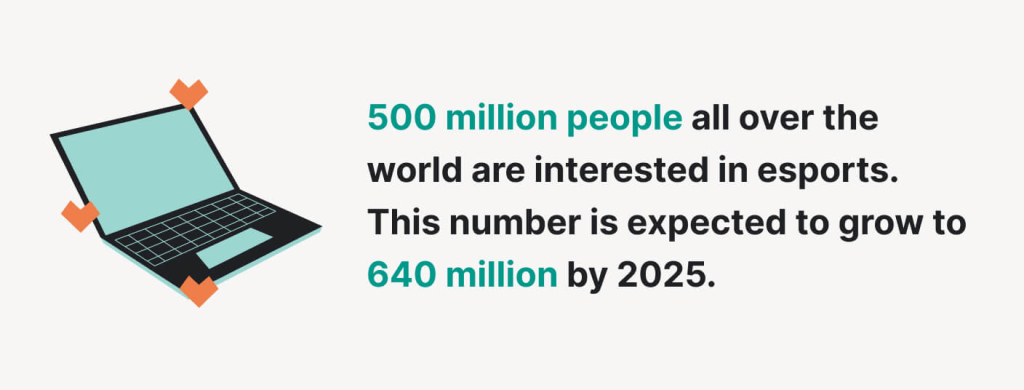
This article by Ivy Panda experts will tell you all about playing esports in college. We will look at how to rise through the ranks in professional gaming, how to enter a college team, and much more. This detailed guide is a must-read for students, parents, teachers, and those interested in esports.
🖥️ What Is Esports & Why Is It Popular?
In a nutshell, esports is competitive multiplayer gaming between two or more teams. It’s similar to soccer or any other sport. There are coaches, tournaments, and devoted fans. Esports even has its own “stadiums.” Instead of giant arenas, these competitions are streamed on platforms such as YouTube or Twitch.
Since its establishment in the 20th century, gaming has come to stay in our culture. People play games and watch esports events even in the remotest places. Today, the video game industry is larger than the music and film industries combined. Think about it: there are movies and books based on games and games based on books and films!
Statistics show that 400 million people internationally are interested in esports and gaming. Since 2020, the global gaming market has grown by 23.1%. And it will only continue to gain momentum.
No wonder many teens and young adults want to grow into professional gamers. Esports celebrities earn big money and become famous all over the world. Do you wish to be one of them? Keep reading!
Esports vs. Gaming: What’s the Difference?
Gaming refers to playing video games on a PC, console, or any other device. Is esports the same as gaming, then? Well, not exactly.
You see, esports is gaming, but not all gaming is esports. The primary characteristic that distinguishes esports is competitiveness. It requires 2 or more people playing against each other, unlike the games you can play alone.
We can call esports a child of gaming. In the 1970s, video games first received a competitive mod, which kickstarted esports development. However, it was in the 2000s that more people got access to the Internet. That’s when the concept of enormous crowds and high prize pools gained appeal. And the rest is history.
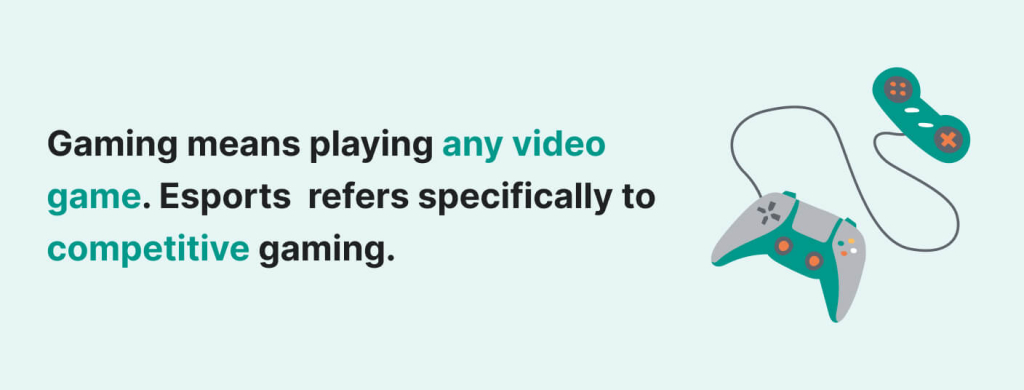
Top 10 Examples of Esports Games in College
Countless games fit for esports, but not all are popular enough to have their own big tournaments. If you plan to join a college team, you should learn which games and genres are trending. No worries: we studied them for you and summarized our findings below.
Here’s what games are played in college esports in 2026:
- League of Legends
League of Legends a strategy-centered game requiring teamwork. Players select unique characters with various strengths and work together against the opposing team with the goal of destroying their main base. This genre is called MOBA (Multiplayer Online Battle Arena,) and there are many other games with similar features. - Dota 2
This is the second most famous MOBA game. It’s very similar to League of Legends but with different characters and abilities. Both Dota 2 and League of Legends derive gameplay from real-time strategic decisions during competition. - Rainbow Six Siege
In this game, teams of attackers and defenders face off in various objective-based scenarios. Players takes on the role of operators with distinctive abilities and playstyles. Teamwork, communication, and strategic gameplay will lead you to victory. - Counter-Strike: Global Offensive (CS)
This game is a classic first-person shooter with a rich history of competitive tournaments. Fans from all over the world choose the side of either terrorist or counter-terrorist and fight against each other. CS has various game mods, but its signature mod is about planting a bomb or defusing it. - Fortnite
Fortnite is somewhat similar to CS. The difference lies in its colorful, cartoonish design alongside crafting and building mechanics. While CS tries to get closer to realism, Fortnite aims to host colorful matches in an open-world arena. - PlayerUnknown’s Battlegrounds (PUBG: Battlegrounds)
This game combines Fortnite’s mechanics with Counter-Strike’s realistic graphics. - Rocket League
This one is like soccer, but with rocket-powered cars. The objective is to score goals by hitting a giant ball into the opposing team’s net. This fun and unique game blends racing, sports, and physics-based gameplay elements. - Valorant
This is a tactical shooter game from the creators of League of Legends. Here, two teams of 5 players each compete in round-based matches. The objective typically involves planting or defusing a spike (bomb) or eliminating the opposing team. - Apex Legends
In Apex Legends, squads of 3 compete against each other on a large map. The goal is to eliminate opponents and survive in the ever-shrinking play area. “Legends” are the player characters, each with unique abilities and personalities. - Call of Duty: Modern Warfare II
This state-of-the art game features the iconic operators of Task Force 141 with a whole lot of innovations. It provides an immersive experience thanks to cutting-edge AI and amazing graphics.
✨ Unexpected Benefits of Esports for Students and Schools
If fame and money aren’t things you’re after, esports has many other things to offer!
Here are its benefits for students:
📝 Esports improve your social, cognitive, and behavioral skills.
Communication plays a key role in esports. Only the strongest teams win competitive matches. While playing as a team, you’ll master many valuable communication skills that will serve you for the rest of your life.
♟️️ It will boost your strategic thinking and time management skills.
Competitive gaming is rife with situations in which you must manage time and resources appropriately. Strategies win wars, and the same thing is true in games.
🌈 Video games promote inclusivity.
In esports, there are no limitations. It doesn’t matter who you are or what your lifestyle is. Gaming, as a whole, is an excellent way for people to be free and feel included.
🔠 Gaming can help you learn languages.
Research has already proven that video games can assist in learning foreign languages. All you need to do is to change the game language in your settings and turn on subtitles. The action and cutscenes will help you understand what the characters are talking about.
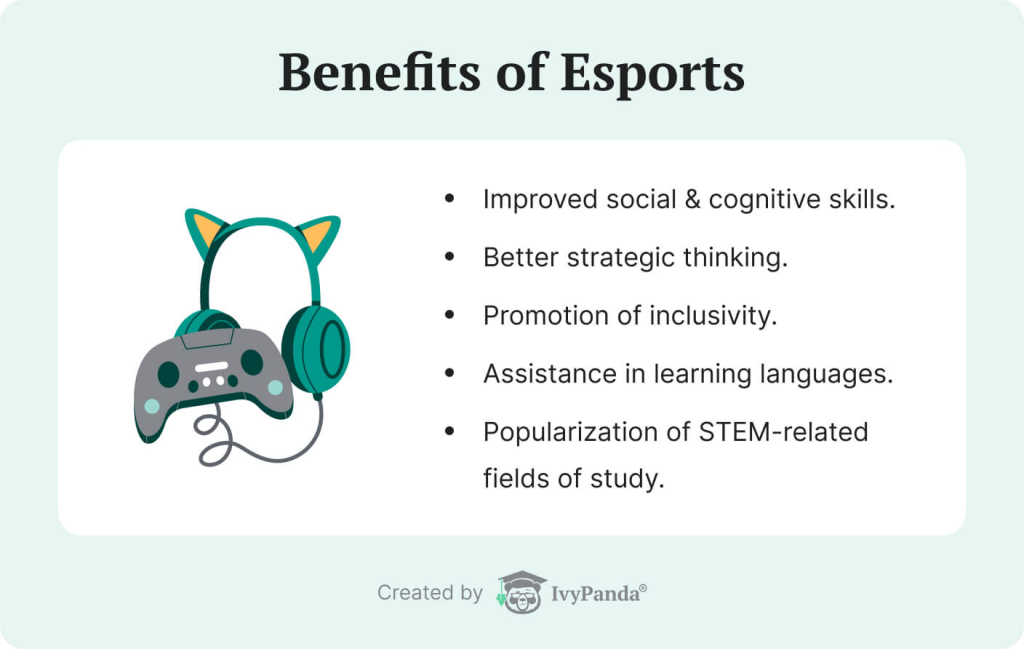
But that’s not all of it—there are also many benefits for schools:
🔥 Any esports-associated event will grant you a ton of promotion.
Gaming events and tournaments attract the youth demographic. It is one of the biggest population groups, so advertising to this market can be very profitable. Unsurprisingly, that’s the reason many companies sign contracts with famous gamers and esports hosts to promote their products.
🏆 Esports can facilitate the perfect event.
If you want to gather many people at your local event, consider esports as your weapon of choice. Many young adults and teens will be drawn to your school or college to compete and win prizes. Esports matches can also serve as team-building exercises for students.
🎓 Competitive gaming boosts graduation rates.
It’s scientifically proven that gamers tend to be more creative and versatile than non-gamers, thanks to their out-of-the-box thinking. This, in turn, helps them study better.
🚀 Esports popularize IT and other STEM-related subjects.
Playing video games can help students find new interests and gain scripting and software development skills. Moreover, it can inspire girls and other underrepresented demographics to study STEM-related subjects.
What Do the Critics Say?
Unfortunately, esports is not without its critics. Despite all the progress, video games and their enthusiasts are still widely stigmatized. In some countries, politicians and activists even want gaming banned. There are many reasons for this attitude:
❌ Video games can cause addiction and health issues.
Not everyone can stop playing when they need to. This causes many people to get addicted to gaming, which leads to detrimental effects. In addition, sitting in a chair and staring at a bright monitor all day is bad for your eyes and spine.
❌ Some video games promote harmful stereotypes.
Many modern games are inclusive, but not all are like that. Some of them (especially older ones) can be stereotypical in terms of racial and sexual imagery.
❌ Cyberbullying.
Esports is a highly competitive environment, and unfortunately, some players resort to bullying and harassment to gain an advantage. You can avoid this by turning off the chat, blocking the toxic person, or reporting bullies for inappropriate behavior.
So, Should You Play Esports in College?
Why not? There are many more benefits than disadvantages. Besides, most problems described above can be prevented.
As a gamer, you should prioritize your health in addition to honing your skills. This way, you can enjoy playing without unnecessary difficulties.
Here are some tips to bear in mind:
- Take scheduled breaks from gaming: stretch your legs, hydrate, and rest your eyes. Experts advise taking a 10 to 15-minute break every hour.
- Exercise between matches to enhance your focus and stamina. Even a brief activity can do wonders.
- Eat balanced meals and space them out. A healthy diet will help you remain energized.
- Only play the games you genuinely enjoy and find engaging. While practicing is essential, forcing yourself through games you despise can quickly lead to burnout.
- Ignore bullies and report them to the game’s moderators. Remember, esports should be a safe and fun space for all.
And most importantly: esports doesn’t oblige you to anything. You are free to quit it whenever you like. Try it and decide for yourself!
🔝15 College Varsity Esports Programs to Choose From
The easiest way to start an esports career is to sign up for your local esports college program. It will allow you to join a team and participate in tournaments. Let’s see which accredited colleges host esports events and have their own teams.

Colleges with Esports Teams in the US
1. Georgia State University
This institution is a part of the National Association of Collegiate Esports (NACE). In addition to esports, it provides instruction in areas like game design, computer science, and business opportunities in the video game media space.
- Location: Atlanta, Georgia.
- Average tuition per year: $8,948 for in-state students and $22,390 for out-of-state students.
2. University of California at Berkeley
This school is renowned for its extensive gaming library and big gaming center. Its teams mainly play Fortnite and Rocket League. UC’s key objective is to promote gender diversity in tournaments.
- Location: Berkeley, California.
- Average tuition per year: $14,312 for in-state students and $29,754 for out-of-state students.
3. Stephens College
Stephens College emphasizes inclusivity and welcomes transgender and non-binary players. Its renowned Overwatch squad is led by a NACE member, Adrienne McIntire. The institution’s team regularly participates in competitions for the Missouri Overwatch Cup and other prestigious prizes.
- Location: Columbia, Missouri.
- Average tuition per year: $23,870.
4. Roosevelt University
This university started one of the first varsity esports programs in the US in 2014. Their primary games are Call of Duty and Overwatch. Roosevelt University attracts international players as well.
- Location: Chicago, Illinois.
- Average tuition per year: $31,493 for in-state students and $39,552 for out-of-state students.
5. University of Utah
The main games played at the University of Utah are Hearthstone, League of Legends, Rocket League, and Overwatch. Fans actively watch games live and communicate on their Twitch channel and Discord group.
- Location: Salt Lake City, Utah.
- Average tuition per year: $9,292 for in-state students and $30,252 for out-of-state students.
6. Miami University (Ohio)
The varsity esports team at Miami University began in 2015 as part of the first D1 varsity program in the US. Players here receive physical training, scholarships, and other support. The institution offers a Junior Varsity program for all students to foster a diverse and inclusive gaming community.
- Location: Oxford, Ohio.
- Average yearly tuition: $16,224 for in-state students and $36,650 for out-of-state students.
7. Robert Morris University
This place is perfect for starting your cybersports career. It hosts countless games like FIFA, Call of Duty, iRacing, Hearthstone, Overwatch, Rocket League, Madden, and Valorant. Most importantly, this institution grants the highest esports scholarships at $19,000 annually.
- Location: Moon Township, Pennsylvania.
- Average tuition per year: $30,830.
8. Kansas Wesleyan University
This is a smaller university on our list, with just over 500 students. Nevertheless, it provides a well-known esports program that has existed since 2015. Its team participates in the Collegiate Star League for League of Legends and several other games.
- Location: Salina, Kansas.
- Average tuition per year: $31,020.
9. University of Pikeville
This school’s cybersports team participates in League of Legends, Overwatch, and Hearthstone competitions. With a degree in the science of game design, coach Nicholas Alverson works out of a cutting-edge gaming facility that this university generously provides.
- Location: Pikeville, Kentucky.
- Average tuition per year: $22,500.
If you’re outside the US, don’t be disappointed! There are also plenty of esports-supporting universities in England and Canada. See them below.
Colleges with Esports Teams in Canada
1. Fanshawe College
This college boasts a thriving team, the Fanshawe Falcons. They partake in various championships, including national tournaments. Their primary games are Overwatch, Rocket League, League of Legends, and Valorant.
- Location: London, Ontario.
- Average tuition per year: $19,220.
2. Ontario Tech University
At the moment of writing, 10 teams from the OTSU Esports program are competing in numerous tournaments, including those for Overwatch, League of Legends, Hearthstone, Call of Duty, Fortnite, Rocket League, and Rainbow Six Siege. Also, these squads participate in different leagues, like the College League of Legends and NACE Starleague.
- Location: Oshawa, Ontario.
- Average tuition per year: $30,000.
3. University of Windsor
University of Windsor’s leading Lancer Gaming team competes against hundreds of other North American schools. Its members play Rocket League, Valorant, and League of Legends.
- Location: Windsor, Ontario.
- Average tuition per year: $20,000.
Colleges with Esports Teams in England
1. University of Warwick
This institution has a formidable gaming center that is accessible to everybody. At Warwick, they play numerous games, for instance, League of Legends, Counter-Strike, Rocket League, Overwatch, Rainbow Six, and Dota.
- Location: Coventry, West Midlands.
- Average tuition per year: £21,000.
2. Durham University
This place is home to the DUEG team. They compete in both NUEL and NSE tournaments, held at a national level. This squad frequently ranks in the top 10 teams nationwide, making it a pretty big deal.
- Location: Durham, North East England.
- Average annual tuition: £10,000.
3. University of Suffolk
Great esports programs are abundant at this university. Its team is fairly young, but they’ve already played quite a few games of Valorant and CS. It’s a suitable place to practice your gaming skills.
- Location: Ipswich, Suffolk.
- Average yearly tuition: £13,000.
College Majors for Esports Gamers
While there are no specific majors that are exclusively designed for esports gamers, there are several fields of study that can be beneficial for those interested in an esports career. If you’re a big fan of competitive gaming and haven’t picked your major yet, here are some of our suggestions:
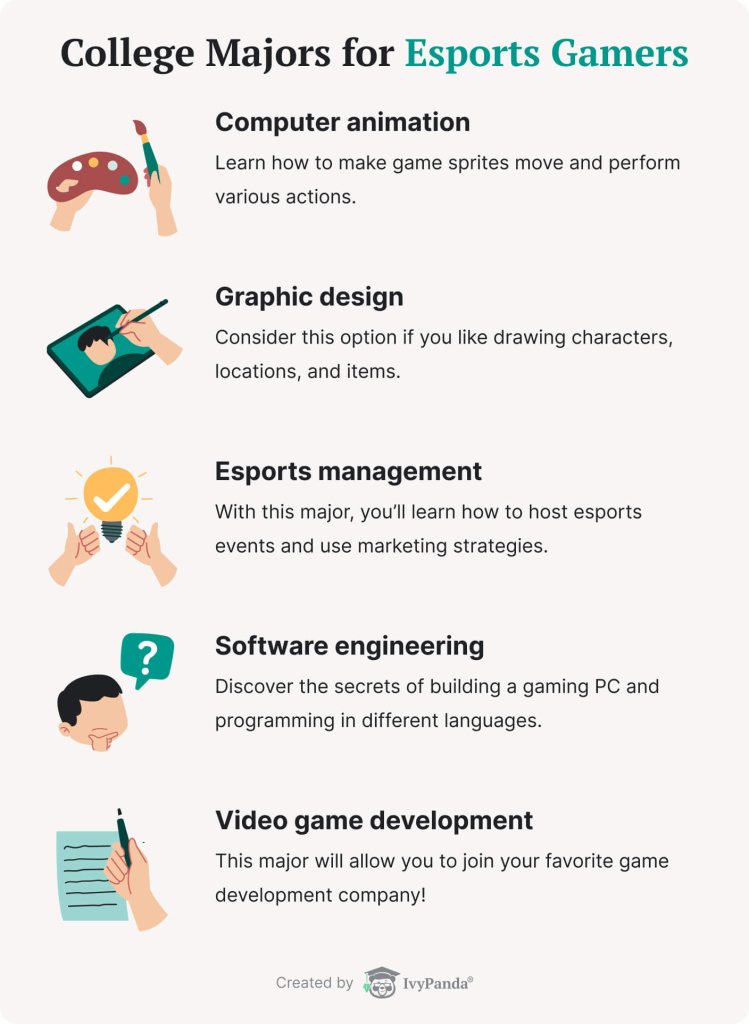
- Computer Animation. Animation is a core part of creating video games. You’ll learn how to make characters move and perform various actions. This sets you up for a career in the videogame industry, working at famous game-developing companies!
- Graphic or Interactive Media Design. If you’re a creative person, consider getting into graphic design. You’ll learn how level design is created and how to draw video game characters, locations, and items.
- Esports Management. If tech stuff doesn’t inspire you, we recommend getting into esports management. It’s not only about hosting various events: you will also learn how to create marketing strategies and commercials for games and manage top events like Gamescom or E3.
- Software Engineering. This vast industry includes building your perfect gaming PC and creating programs in languages like Python or Java.
- Video Game Development. Here, you will learn how to make levels, scripts, and quests through programming languages. Later, you’ll be able to work for your favorite companies: Rockstar, Blizzard, Bethesda, and others.
🎓 Getting into College Esports Programs
With the rising popularity of esports, many colleges and universities are now offering esports programs, allowing students to hone their skills and compete at a collegiate level.
But getting into a college esports program can be challenging, especially if you’re unsure where to start. That’s where we come in. In this section, we’ll explore everything you need to know to kickstart your journey into college esports programs. Let’s dive in!
Choose a Suitable Esports Program
Enrolling in esports is not as easy as it may seem. Make sure to choose your future study program very carefully:
- First, you’ll need to look through the university’s website and check out their study programs. Seek anything that has to do with IT or computers.
- Write down or highlight the parameters of each program. See if you’ll meet their entry criteria.
- Check out other requirements, such as the need to buy your own equipment, the availability of esports scholarships or grants, and the list of games played by the college’s team.
- It’s very helpful to contact the professors and esports coaches at the college for more information. It’s even better if you have friends who already study there.
- Colleges often host esports events, so it would be wise to visit one of them and play a few games. Try talking to team members about their programs during these events.
What to Include in Your Application
After selecting a suitable program, demonstrate your gaming expertise to the college’s admissions team. Follow this roadmap:
- Copy your gaming profiles from various platforms. Collect them into a CV.
- Enumerate which games you excel at and your experience level in each one.
- If you’re already acquainted with the college’s coaches or team members, tell them about your plans and ask them to vouch for you, if possible.
- We highly recommend you add a highlight reel to your portfolio. A highlight reel is a selection of video clips that illustrate your gaming prowess (similar to “Play of the Game” in Overwatch or Dota).
- To enter any college, you’ll need to write an admission essay, and esports is no exception. Just make sure to avoid fixating on your gaming accomplishments. You have plenty of other strengths—showcase them! You want to show that you are good at other things alongside gaming. Don’t forget you’re applying to college, so you’re supposed to be a well-rounded student and not just a gamer.

💡 Quick Tip
Sometimes esports teams look for a pro to fit a specific role. For example, they may agree to take you on if you’re an excellent healer or damage dealer. So, if you’re especially good at some roles, be sure to make it known!
What Makes a Great Candidate
The commission will examine everything that you present them, so it’s good to know what they’re after in the first place. Here are the principal qualities of an ideal candidate:
- Skill. Naturally, this is the crucial factor. A competent player who consistently performs well in matches will be a valuable asset for any esports team.
- Communication. Communication is key in any competitive sport. Someone who can efficiently converse with their teammates will be able to coordinate strategies, make quick decisions, and adapt to dynamic situations more easily.
- Teamwork. Competitive gaming is inherently a team activity. That’s why a player who listens to feedback and contributes to a positive team dynamic will be highly valued.
- Dedication. Esports requires a significant amount of time and effort to succeed. A player committed to practicing, honing their skills, and competing at a high level will be an asset to any team.
- Attitude. Finally, a positive attitude can make a massive difference in esports. Someone who remains calm under pressure doesn’t get discouraged easily, and keeps their optimism even when things aren’t going well can galvanize the team and help them achieve their goals.
Remember that different colleges and esports programs may prioritize other qualities based on their specific needs and goals.
Busting the Myths about College Esports Recruiting
People have a lot of false assumptions about college esports and the recruiting process. You may have already heard some of them. Well, we’re here to disprove them! Let’s look at the most prominent ones below:
- Assumption №1: Grades don’t matter.
❌ False!
Just as soccer players have to pass their grades check before enrolling in a college team, esports is no exception. A certain GPA will be required for your acceptance. Without that, the commission will likely decline your candidacy. - Assumption №2: Esports coaches and team members only want super-pros.
❌ False!
Finding so many professionals is nearly impossible. The main thing coaches and team members want is for you to be able to learn quickly and handle stress. In addition, they want those who can cooperate and listen to the coach’s guidance. - Assumption №3: Esports in college are different from esports in general. There are too many rules and restrictions.
❌ False!
The only difference between playing with your friends on Discord and with your college team is the level of skill required. Esports in college is still about having fun. Generally, there are no strict rules or harsh regulations. - Assumption №4: If I become an esports player, my studies must wait.
❌ False!
As we’ve said before: colleges want you to study. Even your coach understands that you’ll fail and be expelled if you have too little time for learning. Don’t worry; they will give you enough time for studying and esports.
College Esports Scholarships
Perhaps the most satisfying thing about esports is that you can actually make money playing video games! If this sounds exciting to you, then make sure to read this section till the end.
The main thing that you should aim for is securing esports scholarships. To do so, you’ll need to enter a college or university’s esports team and start winning competitions. If you show potential, your college will be more motivated to keep you on their team and offer you a scholarship. The amounts vary from one college to another.
Here are the top 5 scholarships for you to consider (with funding amounts and games played):
- Robert Morris University
- $19,000 a year (one of the highest esports scholarships in the US)
- Rocket League, FIFA, Hearthstone, iRacing, Overwatch, Madden, Call of Duty, Valorant
- Georgia State University
- $10,000 a year
- Smite, Overwatch, League of Legends, Hearthstone, Tekken 7, Dragon Ball Fighter Z
- Kansas Wesleyan University
- $5,000 a year
- Overwatch, League of Legends, Hearthstone
- Stephens College
- $4,000 a year
- Overwatch
- University of California at Berkeley
- $1,666 a year
- Apex Legends, Diablo 3, Dota 2, Fortnite, League of Legends, Hearthstone, Counter-Strike
🎮 How to Start a Career in Esports
Esports is a major industry. Beyond gamers, there are marketing specialists, advertisers, critics, developers, designers, and many other career prospects. As an industry, esports has experienced tremendous growth in the last decade. The global esports market was valued at $1.22 billion in 2022 and is expected to grow to a whopping $5.48 billion by 2029!
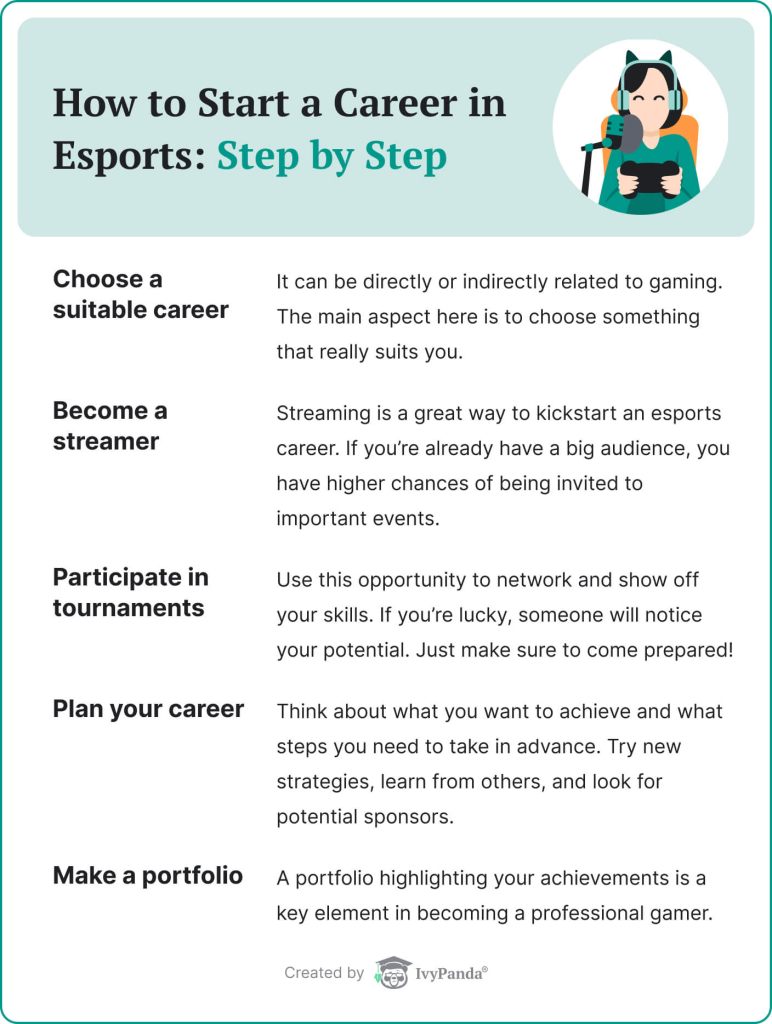
If you’re considering starting a professional esports career, check out what we have for you in this next segment.
1. Choose a Suitable Career
Here’s a list of possible careers that are associated with esports. We’ve also included some jobs close to the industry but not directly connected to the gaming process. Which one sounds like the best fit for you?
Esports player
- Play your favorite games and win money.
- Give interviews to various bloggers and the media.
- In time, you can become a coach or a blogger yourself.
Esports coach
- Teach youngsters how to play like a pro.
- Offer your guidance about different tactics and winning strategies.
- Win big tournaments and feel proud of your team.
Esports host
- Comment on big tournaments and events like Gamescom or E3.
- Encourage the crowd’s enthusiasm.
- Criticize weak players for their lack of skill and complement those who play well.
Marketing manager
- Create commercials for your favorite games and make them popular all over the world.
- Build relationships with your audience and brand reputation.
- Design unique merch, posters, and logos.
Journalist
- Write articles about gaming and esports (just like this article).
- Create your own blogs and media.
- Interview esports stars.
Production manager
- Create breathtaking videos and clips of esports tournaments and important events.
- Broadcast esports and gather millions of views.
- Make sure the visual aspect of gaming broadcasts is perfect.
2. Start by Becoming a Streamer
Streaming is a great way to start an esports career. If you’re already a streamer, you have a major advantage over others looking to go pro as gamers.
- Streamers usually excel at gaming and know how to produce engaging content. This makes them an asset in any esports team.
- Moreover, streaming can give a significant boost to your media career. Even if you don’t have a huge viewership, you’ll have higher chances of receiving invitations to prestigious esports events.
Best Gear for Streaming
We’ve compiled this list of tried-and-tested favorites to help you with the gear required for quality streaming. These items are not obligatory (except for the PC, of course,) but having them at your disposal will make your content more professional.
- A gaming PC or console.
Generally, if we’re talking about a good gaming PC build, it should at least have an Intel core i5-i9, GeForce 1600 or higher, and 8 GB or higher RAM. It would cost you around $800—$1000. Here’s a hint: if you can build a PC from scratch, the price drops by about half.
The brands we recommend: MSI, Asus Rog - A professional microphone.
Nothing is more irritating than hissing sounds coming from a cheap mic. If you want your viewers to enjoy your voice, be sure to buy a quality microphone. It should cost you around $100—$500.
The brands we recommend: Razer, Blue Yeti - A good camera.
Your integrated PC camera likely won’t do the trick. If you want your streams to look nice, buy a movable camera. A good camera will add a professional feel to your streams and allow your viewers to see your reactions. It will cost around $200.
The brands we recommend: Logitech Brio, Razer Kiyo - A professional light stand.
A professional lighting stand is helpful but not essential to make the content look more polished. It should cost you around $50. Here’s another hint: if you don’t use a camera, you won’t need any lights at all.
The brands we recommend: Sensyne, UBeesize
3. Participate in Tournaments
If you’re going to start a career in esports, you’ll be participating in various tournaments, so why not start attending them right now? There, you can make friends with other gamers, esports athletes, coaches, and even sponsors!
We also highly recommend taking the first step and signing up for a tournament. Set yourself on winning the prize, or at least make sure to show everyone what you’re made of.
Your first tournament will most likely be grassroots. Still, it will be best to come prepared because even local matches have very motivated participants. If you succeed in demonstrating your skill, esports officials will likely notice your potential.
4. Expand Your Knowledge
So, you’ve chosen a career for yourself. What now?
At this point, we recommend you start expanding your knowledge about the industry. Here are the main tips to follow:
- Read more theory.
Knowledge is power. The more you know about your game’s mechanics, the better prepared you’ll be to face challenges and win. Read strategy guides, watch tutorials, and keep up with the latest updates. If you’ve chosen a career that doesn’t require playing games, it’s still necessary to study the ins and outs of your preferred job. - Try new gaming strategies.
Don’t be afraid to experiment with various tactics and approaches to the game. It will help you develop a more versatile playing style and make it harder for enemies to foresee your moves. - Learn from the champions.
By observing the best players and their tactics, you can gain insights into what works and what doesn’t. Pay attention to their positioning, timing, and resource management. Then, look for ways to incorporate these strategies into your gameplay. - Don’t neglect industries connected to esports.
Gaming events, commercials, and software development are all industries that are closely tied to esports. By keeping up with trends in these fields, you can better understand the larger context and take advantage of related opportunities. - Get more people to notice you.
Promote yourself through social media, streaming platforms, and other online channels. Engage with other gamers and build a strong online presence that showcases your skills and personality. - Try to find powerful sponsors.
Sponsors can provide financial support, cutting-edge gear, and exposure to help you take off your esports career. Make sure to look for brands that align with your values and interests. Don’t be shy and reach out to them to discuss potential partnerships.
5. Make a Strong Portfolio
A portfolio plays a major role in any career, and esports is no exception. Be sure to collect records of all your achievements carefully. These include:
- Play of the Game clips.
- Prizes.
- Awards.
- Recommendations.
- Grants and certificates.
- Comments from your fans.
Don’t neglect even the smallest achievements. If they seem insignificant to you, they may still be of value.
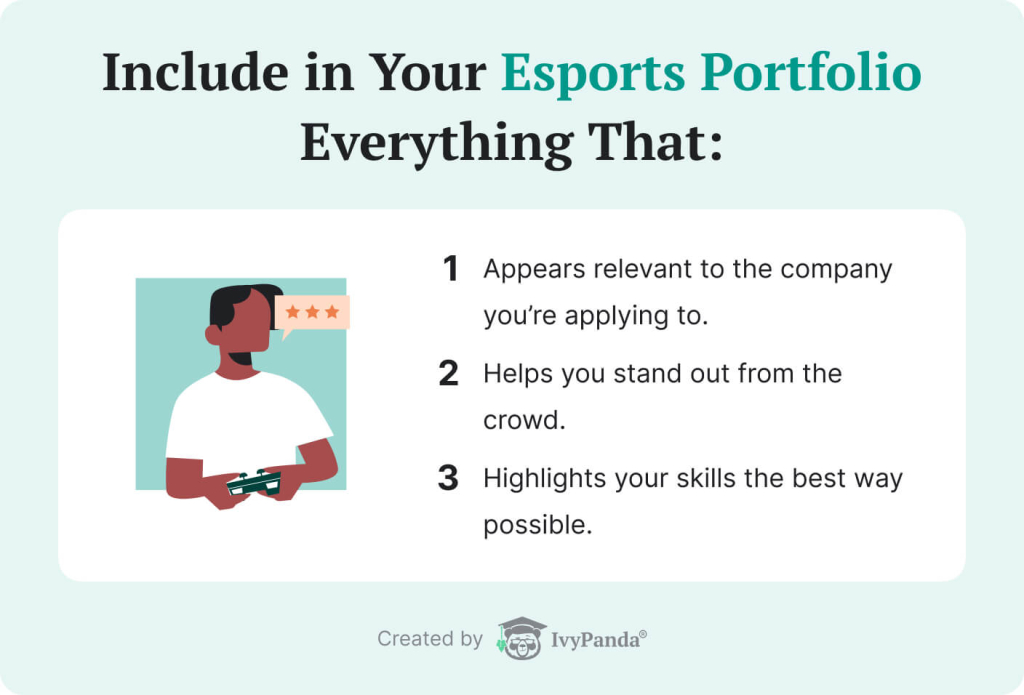
💡 Quick Tip
If you’re a seasoned gamer, then make a list of your top 10 biggest achievements. Provide proof, such as screenshots or links to your gaming profiles. Visualize this data in a colorful presentation with explanatory comments.
🤔 Are Esports Degrees Worthwhile?
The last thing we’d like to discuss is having a degree in esports. It’s a debatable topic among gamers, so it’s necessary to address it.
Many professional gamers have an esports degree. Alongside that, we also can’t deny that if you’re devoted and ambitious, you may surpass any of them in your skill without having any professional education. So, what should you do?
Your decision will ultimately depend on several factors. To see what’s best for you, try answering these questions:
- What are your career goals?
A degree may be unnecessary if you wish to become a professional player. Yet, if you’re considering a career in esports management, event production, or game design, a degree could raise your chances of getting hired. - What do you wish to learn?
Esports degrees can cover anything from game development to marketing. If you’re curious about some aspect of esports, having a degree may be a suitable option. - What are the costs and benefits?
Esports degrees can be pricey, so weigh the pros and cons meticulously. Think about the tuition cost and the potential ROI (job prospects and earning potential). - What other options are available?
Are you unsure about the feasibility of obtaining an esports degree? Examine other options, like internships, online courses, or networking opportunities. These are more affordable and flexible than a traditional 4-year program.
All in all, you should base your decision on your career ambitions and interests. A degree is worth obtaining if you’re devoted to esports and intend to seek employment in this niche. It will provide helpful knowledge and skills and raise your likelihood of landing a job. Yet, contemplate the benefits and shortcomings before deciding.
🎁 BONUS: How to Start an Esports Team at College
If your school lacks a solid gaming culture, or if existing teams already have enough members, why not start your own squad? It’ll give you a bunch of benefits, allowing you to participate in tournaments and potentially making your school famous in cybersports!
Here’s how to create an esports team from scratch:
- Set your objectives. Before gathering team members, visualize and articulate what your team aims to achieve. Telling the potential candidates about your goals will help them connect with your vision for the future.
- Find those who are interested. Anyone eager to try their hand at competitive gaming is worth consideration. You can search among your classmates, friends, or even co-workers. Ideally, your squad should comprise primarily students from your school.
- Structure your team. Determine the roles, choose a leader, and select the games you will play. Also, don’t forget to create a memorable logo and motto.
- Find the essential gear. Without this step, you won’t be able to begin practicing. At the very least, you need fast PCs to run the games smoothly.
- Register for tournaments. After you and your teammates have trained for some time, you’re ready to sign up for a local contest. It’s time to put your team on the map of the esports world.
- Don’t hesitate to ask for help. Reach out to professional coaches or send a few letters to colleges with esports programs. Look for any opportunity to further your team’s skills and expertise.
Now you know everything about playing esports at college. We hope you liked our article! What are your thoughts on esports? Do you wish to try it, or are you already a seasoned player? Tell us in the comments!
🔗 References
- What is eSports? A Look at an Explosive Billion-Dollar Industry: CNN
- Esports Part 1: What are Esports?: Harvard University
- eSports: Investopedia
- What is Esports?: The University of Oklahoma
- The Growing Trend of Esports: Why 2023 is Going to be a Massive year for Esports: Medium
- History of Esports – About Us: Illinois University Edwardsville
- Esports Are Being Taught in Schools. Could They Give Students Useful Workplace Skills?: World Economic Forum
- Esports: The Future of Engaging Education: Acer
- Benefits of Bringing an Esports Club to Your School: Adorama
- Esports Careers: How to Gain an Edge in a Quickly Growing Industry: Johnson & Wales University
- A College Degree in Esports? Yes!: Verizon
- Esports as a Degree: LinkedIn
- Colleges Are Starting Degrees in Esports, with $36,000 Programs: CBS News
- Esports Degree: ‘I Won’t Spend Three Years Playing Games’: BBC
- Why Esports in Schools Is a Good Thing: ViewSonic
- The Most Valuable Esports Companies 2022: Forbes
- Top 15 eSports Teams, Earnings, and Salaries: Influencer Marketing Hub
- eSports: Could It Become more Popular than the Real Thing?: Euronews
- Should Universities Be Recruiting For Esports?: New York University
- Esports Ecosystem: Key Industry Companies, Viewership Growth Trends, and Market Revenue Stats: Insider Intelligence
- How the Esports Industry Can Accelerate Audience Growth: Morning Consult
![The Complete Guide to Esports in College: Everything You Need to Know [2026]](https://ivypanda.com/blog/wp-content/uploads/2023/07/young-gamer-having-fun-with-action-video-games-competition-playing-online-game-championship-caucasian-woman-enjoying-rpg-play-tournament-live-stream-gaming-modern-computer-736x491.jpg)


![Your First Year of College: How to Prepare & Be Successful [+ Infographic]](https://ivypanda.com/blog/wp-content/uploads/2023/03/shocked-fuuny-young-female-wonk-stares-notebook-carries-pen-has-piles-papers-workplace-wears-spectacles-striped-clothes-309x208.jpg)